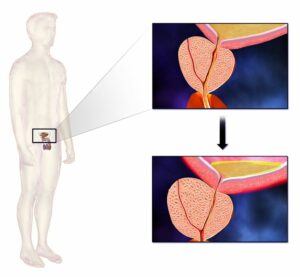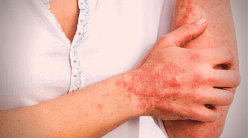What Is A Prostate
The prostate is a gland of the male reproductive system in most mammals. Its function is to secrete some of the fluid in men’s sperm, which helps to carry sperm from the testicles during ejaculation. This fluid usually constitutes roughly 30% of the volume of the semen along with spermatozoa and seminal vesicle fluid. It also contains some smooth muscles, which contribute to expel semen during ejaculation.

How Large Is A Prostate
A healthy human male prostate is slightly larger than a walnut. With aging, the prostate may grow. Problems with enlarged prostate usually start after 50, but they can start earlier.
Where Is Prostate
It is found below your bladder and in front of your rectum. It surrounds part of the urethra, through which the urine flows out. An enlarged prostate can squeeze that part of the urethra and thus impedes the flow of urine.
To function correctly, the prostate needs male hormones. The main hormone is testosterone, which is largely produced by the testicles.
What Causes Enlarged Prostate
Enlarged prostate or known as prostatomegaly may be due to any of the following conditions:
- Benign Prostatic Hyperplasia( BPH ): This condition typically occurs in older men. The prostate enlarges to the point where urination becomes difficult. Symptoms include the need for frequent urination or taking a while to get started. If the prostate grows too large, it can narrow the urethra and interfere with the flow of urine, making urination difficult and painful, and in extreme cases completely impossible.
- Prostatitis: Is an inflammation of the prostate gland. There are four different types of prostatitis, which are known as acute bacterial prostatitis, chronic prostatitis, chronic nonbacterial prostatitis ( chronic pelvic pain syndrome ), and asymptomatic prostatitis. All of them occur with different causes and outcomes.
- Cancer: Prostate cancer is one of the most common cancers among older men. It can be treated successfully if it is detected in the early stage. Signs and symptoms include problems with urinating, blood in the semen or urine, difficulties with erection, pain in the hips, back, and chest, weakness or numbness in the legs or feet, or even loss of control of the bladder or bowel due to spinal cancer.
Symptoms of Enlarged Prostate
When the prostate gets larger it narrows the urethra and causes symptoms that interfere with your urine flow, such as:
- Difficulties with urination
- A hard time getting started
- Post urination dripping
- Painful urination
- A weak urine stream
- Frequent need for urination ( 8 times or more per day )
- Incontinence
- You need to pee several times a night ( nocturia )
- In extreme cases blood in urine or sperm, erection issues, painful ejaculation, pain in the hips and back, weakness or numbness in the legs or feet, loss of control of the bladder or bowel due to spinal cancer.
How To Have Healthy Prostate
- Eat Plenty of Fruits And Vegetables
- Eat Healthy Fats: Avoid conventionally processed fats and hydrogenated oils. Consume omega-3 rich foods, such as certain seeds ( linseed, black seed, hemp seed,…) and cold-pressed oils.
- Chose Plant Protein Over Animal Protein: red meat, dairy products, and animal fats are often involved in the development of prostate cancer.
- Eat Whole And Natural Food: Natural food is usually high in fiber, which helps to promote overall prostate health.
- Ensure Adequate Intake Of Probiotics And Prebiotics: ex. drink kefir!
- Maintain a Healthy Weight: Obesity is linked to a higher risk of prostate cancer.
- Exercise Regularly: Regular exercise has a preventive effect on prostatitis, BPH, and inflammation.
- Live a Prostate Friendly Lifestyle: Avoid smoking and drinking, sleep at least 8 hours a day and avoid exposures to radiation.
- Hydrate Enough: Drink at least 2 liters of pure mineral water per day.
- Maintain A Healthy Sex Life: According to scientific researches, 21 orgasms per month is optimum for a healthy prostate.
- Maintain Hormone Balance: Hormone management and regulation play an important role in prostate health. As stated by The World Health Organization, ” diet might influence prostate cancer risk by affecting hormone levels.”
- Try Alternative Therapies: Acupuncture, homeopathy, hormone restoration, biofeedback, massage, reflexology and stress management techniques are all beneficial for prostate health.
Wanna Learn More About Natural Remedies For Enlarged Prostate? Click Here
Reference: Wikimedia-Prostate: https://en.wikipedia.org/wiki/Prostate
Disclaimer: All information presented on this website is for informational purposes only. These statements have not been evaluated by the Food and Drug Administration. This website is not intended for diagnosis, treatment, treatment or prevention of disease and is not intended for substitution treatment. This information is not meant to cover all possible uses, precautions, interactions or adverse effects. This information may not fit your specific health circumstances. Never delay or disregard seeking professional medical advice from your doctor or other qualified healthcare providers because of something you have read on whatcure.com. Please seek the advice of a healthcare professional for your specific health concerns.







